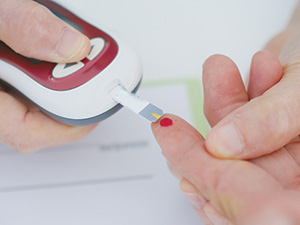 While most people are anxious about the coronavirus, people with underlying conditions such as diabetes may be especially so, according to the American Heart Association and the American Diabetes Association.
While most people are anxious about the coronavirus, people with underlying conditions such as diabetes may be especially so, according to the American Heart Association and the American Diabetes Association.
On top of life’s usual demands, new strain related to the pandemic is taking a toll. As of late March, preliminary data from the Centers for Disease Control and Prevention for about 7,100 U.S. coronavirus patients showed that along with older age, various health conditions — most commonly diabetes, chronic lung disease and heart disease — put patients at risk of developing severe viral illness.
Specifically among intensive care patients with COVID-19, 32 percent had diabetes. For hospitalized COVID-19 patients not in the ICU, 24 percent had diabetes. Yet for people with COVID-19 who did not require hospitalization, only six percent had diabetes.
Earlier, more extensive research from China published in the Journal of the American Medical Association showed a two percent fatality rate among COVID-19 patients. But this rate jumped to about 10 percent for those who also had cardiovascular disease and to about seven percent among those with diabetes. A report from Italy found among 481 patients who died of the virus, about one-third had diabetes. That represents a risk of death five times higher than would be expected based on diabetes’ overall prevalence in Italy, said Dr. Robert Eckel, an endocrinologist at the University of Colorado School of Medicine.
COMPLICATIONS MORE LIKELY
While there’s much to learn about COVID-19, its course in people with diabetes appears to loosely parallel that of influenza. Outcomes are less stable, ventilators are more commonly needed, and severe complications are more likely in people with diabetes who get the flu, said Eckel, current president of medicine and science at the American Diabetes Association.
The reasons are complicated. In people with Type 2 diabetes, insulin resistance gives rise to chronic, low-grade inflammation, leaving the immune system dulled by this ongoing state of alert. New infections are like “crying wolf” — the immune system does not rally quickly and adequately, therefore allowing the virus to gain and maintain a foothold.
But the flu is not as dangerous as COVID-19 infection. And in COVID-19 patients with diabetes, additional risk factors such as heart disease, sometimes undiagnosed, are compounding the problem, said Eckel, who also is a past president of the American Heart Association.
CONTROLLING BLOOD SUGAR HELPS
Doctors’ experience with bacterial infections indicates that controlling blood sugar before and during infection can be helpful. During the crisis, hospitalized COVID-19 patients who have diabetes should ensure that their glucose is carefully managed — and to monitor it themselves, with their own supplies, if they are able.
A diabetes complication called diabetic ketoacidosis, or DKA, is a risk with other viral infections and a concern in coronavirus patients, he said. DKA occurs when an absolute or relative insulin deficiency prevents cells from using glucose for energy and they burn fat instead, creating chemicals called ketones that build up in the blood and can be toxic.
Amid a serious infection, diabetes drugs called SGLT2 inhibitors contribute to an increased risk for DKA. Patients with COVID-19 should talk to their doctor about stopping these medications at the time of hospitalization, and possibly sooner.
Another diabetes drug, metformin, also might need to be discontinued in hospitalized coronavirus patients, he said. Under extreme circumstances, including dehydration and kidney disease, metformin could foster acidosis and even exacerbate kidney disease when intravenous contrast agents are used in imaging.
Outside the hospital, the American Diabetes Association recommends keeping blood sugar well controlled and consulting health care professionals about managing risk and any viral symptoms. If feeling very ill — including higher fever with cough and shortness of breath — people should seek emergency care.
“Patients with diabetes need to be alert about not delaying if they’re getting sick, particularly over a short time interval,” Eckel said.


